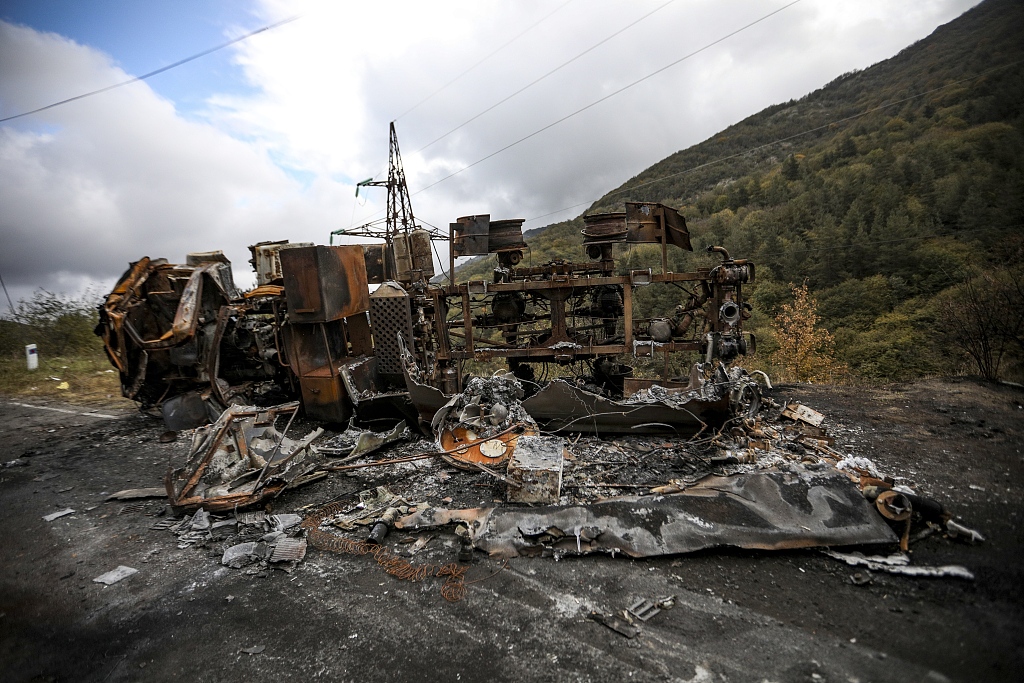Azerbaijan's President Ilham Aliyev on Wednesday pulled out of an EU-brokered meeting with Armenian Prime Minister Nikol Pashinyan, dealing a blow to prospects for rescuing the peace process between the two countries.
The meeting had been aimed at preventing any further escalation and restoring dialogue after Azerbaijan last month seized back control of a region populated by ethnic Armenians, prompting more than 100,000 of them to flee to Armenia.
Pashinyan, in need of support to tackle the resulting humanitarian crisis and shore up his embattled leadership, said he would still attend Thursday's talks in Spain with EU Council President Charles Michel and the leaders of France and Germany.
But Azerbaijan's state-run APA news agency, citing unnamed sources, said Aliyev had decided not to go.
A source in Aliyev's administration confirmed to Reuters that the president would not go, but said he was prepared to talk instead in a three-way format with Pashinyan and the EU's Michel.
Tensions between Armenia and Azerbaijan have flared up since Azerbaijan's military offensive and takeover of the disputed region of Nagorno-Karabakh on September 19, resulting in the displacement of over 100,000 ethnic Armenians from the region.
On September 27, Samvel Shahramanyan, the president of the self-proclaimed Nagorno-Karabakh Republic, signed a decree dissolving all state institutions, effective from January 1, 2024. This move was seen as a concession to Azerbaijan, which had long demanded the dissolution of the Nagorno-Karabakh Republic.
Armenia and Azerbaijan have been at loggerheads over the mountainous region, internationally recognized as part of Azerbaijan. Peace talks have been held since 1994 when a cease-fire was agreed on. But there have been sporadic minor clashes since then.

A burned Armenian truck is seen on the road, near Khankendi in Nagorno-Karabakh region, October 3, 2023. /CFP
A burned Armenian truck is seen on the road, near Khankendi in Nagorno-Karabakh region, October 3, 2023. /CFP
'An anti-Azerbaijani atmosphere'
According to APA, Aliyev had wanted his ally Türkiye to be represented at the meeting, but that France and Germany had objected. It's reported that Baku felt "an anti-Azerbaijani atmosphere" had developed among the meeting's potential participants.
"Azerbaijan did not consider it necessary to participate in negotiations in this format," an Azerbaijani government official told AFP.
Aliyev would not attend because of "pro-Armenian statements by French officials... and statements on the supply of weapons and ammunition (to Yerevan), on military cooperation," the official told AFP. French Foreign Minister Catherine Colonna said in Yerevan on Tuesday that Paris had agreed to deliver military equipment to Armenia, without elaborating.
The Azerbaijani official also said that Aliyev's decision was also influenced by "accusations made yesterday by EU Council President Charles Michel."
Michel, who has mediated several meetings between the foes in recent years, criticised Baku's use of military force.
Iran ready to mediate
Iranian President Ebrahim Raisi on Wednesday voiced the country's readiness to help ensure peace and stability in the Caucasus region and resolve differences between Azerbaijan and Armenia.
Raisi made the remarks in separate meetings in Tehran with Secretary of Armenia's Security Council Armen Grigoryan and Khalaf Khalafov, Azerbaijani president's representative on special assignments, according to the statements from the Iranian President's Office.
In his meeting with Grigoryan, Raisi voiced Iran's opposition to foreign interference in the Caucasus region and stressed Tehran's position that the differences between Armenia and Azerbaijan should be resolved through dialogue.
Raisi also called for safeguarding the rights and security of ethnic Armenians in Nagorno-Karabakh, conveying Tehran's readiness to collaborate in ensuring peace, stability, and security in the Caucasus region.
For his part, the Armenian official thanked Iran for its support in emphasizing the importance of respecting the national sovereignty and territorial integrity of countries in the region.
In his meeting with Khalafov, Raisi emphasized the importance of preserving the region's borders and geopolitical status quo, expressing Iran's willingness to support regional discussions in the 3+3 format or any other suitable framework aimed at resolving issues and addressing tensions between Azerbaijan and Armenia.
Regional countries are capable of addressing the region's issues, said the Iranian president, adding that none of the regional states would gain "from the presence of foreign countries under any circumstances."
Khalafov said Azerbaijan deeply believes that regional issues should be resolved through cooperation and dialogue among the region's countries without letting transregional states in.
He added Baku welcomes any dialogue, particularly within the 3+3 format, to enhance regional cooperation and address the region's problems.
The 3+3 format brings together the three Caucasian states of Armenia, Azerbaijan, and Georgia, as well as its three neighbors, Iran, Russia, and Türkiye.
(With input from agencies)